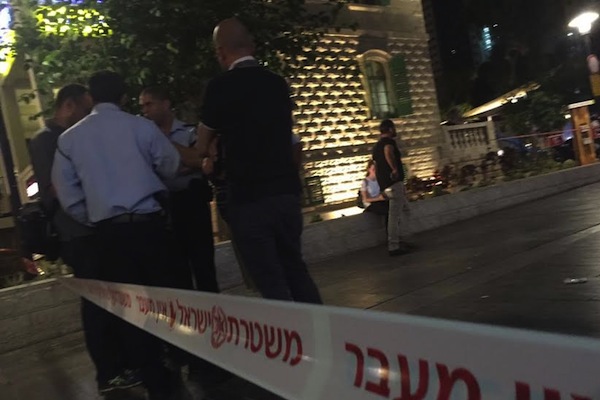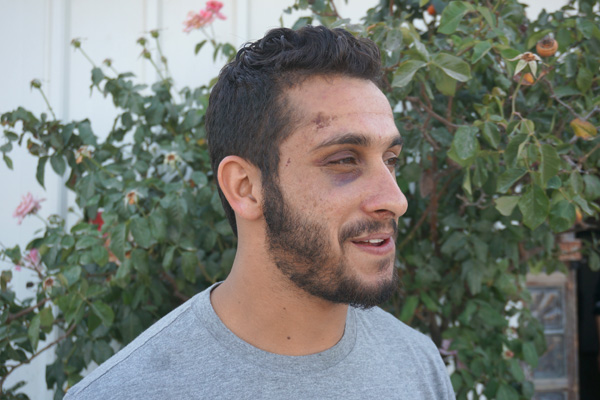Having a daily routine to go back to that is free of violence is a privilege that most Israelis have and most Palestinians do not.

I was out last night in Tel Aviv at a poetry book launch for a good friend when the news flashed on my phone that there was a shooting in the Sarona Market. I got that sinking feeling in my gut and couldn’t take my eyes off Twitter, even as I continued to drink my beer and listen to the recitation of deeply moving and thoughtful contemporary Hebrew poetry.
Life does go on here despite the violence. That’s just the reality. But when I read the statement by Tel Aviv Mayor Ron Huldai that Israelis cannot let such terror “disrupt our lives” and that we should “return to business as usual” tomorrow, I become enraged. Why shouldn’t this disrupt our lives? It did disrupt our lives and will continue to disrupt the lives of many Israelis — among them, the victims, their families and friends, all the people who work in Sarona, all the people who have been there, who live around there, etc. Why should we continue to sip our cappuccinos and beers without being disrupted and disturbed? Why shouldn’t such an act, and so many others like it, cause us to take pause?
The word “disruption” here also dismisses the fact that the lives of so many Palestinians are “disrupted” all the time. The entire city of Yatta, where the two murderers are from — a population of about 65,000 people in the occupied West Bank — is now under military lockdown. This is collective punishment, a mass “disruption” if you will, on top of the already systematic “disruption” of military occupation. No Israeli city, town or settlement has ever been under lockdown after one of its residents committed a violent act against Palestinians.
Mayor Huldai implored us to go back to our routine, back to business as usual. But this is completely misguided. Many people often comment on how remarkable it is that Israelis can just go on with their lives within all the terror. But strength and resilience will not come from trying to push reality aside, disregarding the entire picture and continuing on as if life here is normal. Rather true strength will come from looking critically and deeply at all the factors that go into perpetuating systematic, cyclical violence.
And “routine” is a very relative term: it depends on whose routine you are looking at. The fact that most Jewish Israelis have the ability to go back to a “normal” routine reflects an immense privilege. They have the privilege of freedom of movement and human rights and a representative government to protect them and so many other rights that Palestinians simply do not have. Having a daily routine to go back to, a routine that is free of violence, is a privilege that most Israelis have and most Palestinians do not. And yet, for Israelis too, the routine is increasingly filling with violence.
(It is important to note that Mayor Huldai on Thursday went on to make a statement in which he drew a direct correlation between the terrorism that strikes Tel Aviv and the occupation of the Palestinians – a rare thing to hear these days from any politicians in power. “”We might be the only country in the world where another nation is under occupation without civil rights. You can’t hold people in a situation of occupation and hope they’ll reach the conclusion everything is alright,” he said.)
In Amos Harel’s analysis Thursday morning in Haaretz about the shooting, the opening paragraph starts by stating that this was “the first lethal attack in Israel in exactly three months. The last time that the so-called ‘stabbing intifada’ claimed a life was in March, when American citizen Taylor Force was killed in Jaffa. In the months since that attack, there has been a sharp decline in the number and severity of attacks. Some members of the Israeli defense establishment even started to believe that the worst of the attacks were behind us.”
But in the last three months, there were attacks, some of them lethal — not against Israelis but against Palestinians who did not appear to pose an immediate threat. But even if we put aside those incidents in which Palestinians who attempted to or committed stabbings were shot and killed on the spot, there are so many other incidents of violence by Israelis against Palestinians that the statement “the worst of the attacks are behind us” could never be written by any Palestinians. Remember Mayasem Abu Alqian who was assaulted outside a Tel Aviv supermarket just a couple of weeks ago, just for being Palestinian? And this is a citizen.
In the last three months, there was no decline in the systematic, daily oppression and violence against Palestinians. This is in no way a justification of Palestinian violence against innocent Israelis. But as long as Palestinian life and Palestinian lives are transparent to Israelis, as long as Palestinian victims of Israeli violence in its various forms and degrees is disregarded, as long as their stories and investigations evaporate into thin air and the accountability for their suffering remains unanswered, there is no chance that the cycle of violence will end.
I hold these two Palestinian murderers responsible for this crime. But I also hold the Israeli leadership and the media and the justice system and all those who assume that normalcy, routine and quiet can apply to one group of people and not another living under the same mechanisms of control here. The mainstream Israeli expectation that we can and should continue to enjoy business as usual, prosperity, tranquility, etc. while continuing to be an occupying force that inflicts daily suffering on Palestinians is unrealistic and dangerous. It will continue to backfire.
I’m sure people will attack me for this post. How can I possibly dare talk about Palestinian suffering just hours after a vicious murdering spree on Israelis? But my motive, I imagine, is the same as these critics: safety and security, a place to live in that nurtures life, not death.
So maybe instead of going back to business as usual, Israelis should take pause, not only to grieve, but also to examine why it is that under the most ostensibly right-wing government in history we continue to be totally unsafe and under constant threat.



